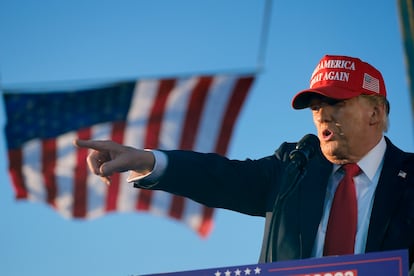Trump invokes the Alien Enemies Act to deport migrants: ‘We have to live with these animals, but not for long’
The law has been applied in the past in the context of war conflicts, but never as a tool for deportation


Donald Trump’s xenophobic narrative reached new heights last Friday during a rally in Aurora, Colorado. The Republican candidate continues to avoid discussing public policy and governance, to instead keep focusing on his anti-immigrant rhetoric and echoing police reports that prove the presence of foreign criminals in U.S. cities (such as those of the Venezuelan gang Tren de Aragua). Now, he is proposing as a solution a piece of legislation that is behind one of the darkest chapters in recent U.S. history: the Alien Enemies Act, enacted in 1798 and used by Democratic President Franklin D. Roosevelt to incarcerate entire families of immigrants of Italian, German and mainly Japanese origin during World War II.
“In Venezuela the crime rate went down 72%. Do you know why? They took the criminals out of Caracas and put them along your border and they said, ‘If you ever come back, we are going to kill you.’ Now we have to live with these animals, but not for long,” Trump said, and he added: “and I will invoke the aliens enemy act of 1798. This was put there in 1798. That is a long time ago, right? To target and dismantle every migrant criminal network operating on American soil.” The Republican also maintained that Colorado will once again be a safe state.
Aurora Mayor Mike Coffman, also a Republican, refuted the former president’s comments in The New York Times, stating that “a considerably safe city — not a city overrun by Venezuelan gangs.” Despite this, Trump decided to call his mass deportation plan Operation Aurora and promised that if he wins in November he will stop what he considers an “invasion” of immigrants across the southern border. In his words, November 5 (election day) will be “liberation day.”
The use of the word “invasion” is key because the Alien Enemies Act, born after the War of Independence to combat British espionage and sabotage, and first used in the War of 1812, is only applicable in cases of “declared war,” invasion or “predatory incursion” into U.S. territory. In these last two cases, presidents can invoke the legislation without congressional approval. Still, it has never been used for the purpose Trump is pursuing: to dismantle any criminal network of migrants operating in the country and then justify the expulsion of another 11 million undocumented immigrants who pay taxes and contribute to the country’s economic growth.
Is the use of the controversial law feasible?
Trump’s ambition could face legal barriers. The law states that removal of individuals can take place whenever “any invasion or predatory incursion is perpetrated, attempted, or threatened against the territory of the United States by any foreign nation or government. (...) the President of the United States shall make public proclamation of the event, all natives, citizens, denizens, or subjects of the hostile nation or government, being males of the age of fourteen years and upwards, who shall be within the United States, and not actually naturalized, shall be liable to be apprehended, restrained, secured and removed, as alien enemies.”
In this sense, Trump’s Operation Aurora falls outside the text of the law because of the presence of undocumented immigrants, as well as those who have committed a crime (figures from the Federal Bureau of Prisons reveal that 90% of the country’s inmates are Americans and not immigrants), is not linked to a “declared war” or a “predatory invasion” of another country, even if the xenophobic rhetoric wrongly classifies it as such.
Jordan Rubin, a former prosecutor for the New York County District Attorney’s Office believes Trump’s recent invocation of 18th-century law was not a random thought. “Nor can we be sure what would happen if an enforcement attempt landed at a Supreme Court that has taken an expansive view of presidential power — especially if Trump and Republicans are able to further shape the court.(...) So if he wins in November, we could soon find out how far the high court will let him go on this front,” he wrote on his MSNBC blog.
The former president already has a precedent in the matter. During his term in office and via executive order, he banned the entry of citizens from Muslim countries (Iran, Iraq, Syria, Somalia, Yemen, Sudan and Libya), even if they requested asylum, had refugee status or an entry permit. The measure was widely criticized as a violation of civil rights.
Sign up for our weekly newsletter to get more English-language news coverage from EL PAÍS USA Edition
Tu suscripción se está usando en otro dispositivo
¿Quieres añadir otro usuario a tu suscripción?
Si continúas leyendo en este dispositivo, no se podrá leer en el otro.
FlechaTu suscripción se está usando en otro dispositivo y solo puedes acceder a EL PAÍS desde un dispositivo a la vez.
Si quieres compartir tu cuenta, cambia tu suscripción a la modalidad Premium, así podrás añadir otro usuario. Cada uno accederá con su propia cuenta de email, lo que os permitirá personalizar vuestra experiencia en EL PAÍS.
¿Tienes una suscripción de empresa? Accede aquí para contratar más cuentas.
En el caso de no saber quién está usando tu cuenta, te recomendamos cambiar tu contraseña aquí.
Si decides continuar compartiendo tu cuenta, este mensaje se mostrará en tu dispositivo y en el de la otra persona que está usando tu cuenta de forma indefinida, afectando a tu experiencia de lectura. Puedes consultar aquí los términos y condiciones de la suscripción digital.








































